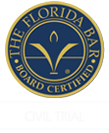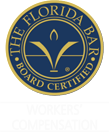DANIEL L. HIGHTOWER, P.A., LAWYER
FIGHTING FOR ACCIDENT VICTIM JUSTICE SINCE 1976
For over 30 years, I and now my Senior Associate Attorney, Mark Tipton, have been representing and helping people who applied for Social Security Disability benefits and the Social Security Administration denied their claims. We’re experienced in this legal field and more often than not, we’ve been successful in helping our clients eventually qualify for and receive Social Security Disability benefits on a No Recovery, No Fee basis.
When you have had the unfortunate experience of being denied Social Security Disability benefits, knowing what to do and what to expect can be a daunting task at best. That is why I have asked Mark Tipton to put together some information in this latest blog, about some of the things that you can expect to encounter during this process and why hiring an experienced lawyer in the field of Social Security Disability will be helpful to you. Below is the biographical information on Attorney Mark Tipton in my office and an article that he has written on Social Security Disability.

MARK N. TIPTON
● Social Security Disability/Supplemental Security Income
● Workers’ Compensation
Mark Tipton received a Bachelor’s degree from Weber State College in 1988. While attending Weber State College, he had the privilege of being selected for an internship with the Utah Legal Services Corporation, where he represented clients in social security disability and other public entitlement cases. Thereafter he attended the University of Florida College of Law where he received his law degree in 1991. He was admitted to The Florida Bar in 1991 and has practiced in the Ocala/Gainesville area since that time. He has limited his practice almost exclusively to workers’ compensation and social security disability cases since being admitted to The Florida Bar. Mark Tipton received Board Certification in workers’ compensation in 1998, based upon his experience litigating Workers’ Compensation cases and his knowledge of the law. Board Certification is the highest level of recognition of the competence and experience of attorneys by The Florida Bar. Mark holds an AV® Preeminent™ rating from Martindale Hubbell Peer Review.
In addition to workers’ compensation, a significant portion of his practice is devoted to representing clients in social security disability cases. His experience with the Legal Services Corporation exposed him to many abuses that occur in the Social Security System and the seemingly needless barriers which people have to overcome to receive social security benefits. As a result, he is committed to ensuring that people who meet the social security disability standard receive proper representation and a fair opportunity to establish their entitlement to the disability insurance benefits.
EXPECT THE UNEXPECTED
SUMMARY OF THE SOCIAL SECURITY DISABILITY LAW, PROCEDURES AND TIMELINES
BY MARK N. TIPTON
There are different categories of disability benefits available under the Social Security Act including “disability insurance benefits”, “widow(er)’s disability benefits”; and “supplemental security income” (SSI) benefits. All of these programs use essentially the same disability standard, but the underlying eligibility criteria, as discussed below, differs from program to program.
When you file for any category of Social Security disability benefit, you as the applicant have the initial burden of proof. Your burden is to establish that you have one or more medical conditions that have lasted or can reasonably be expected to last for at least 12 months, and which would negatively impact your ability to work. Some medical conditions, known as the “listed impairments” (found in 20 CFR Part 404, Subpart P, Appendix 1) are so severe as to be presumptively disabling. If you are determined to suffer from one of those conditions, a finding of “disabled” will be made without regard to any other vocational factors. Still other medical conditions are so severe and so patently disabling that they will allow Social Security to expedite the application and approval process. Most of the compassionate allowance conditions are types of cancers, adult brain disorders, and a number of rare disorders that affect children. In most disability cases the medical evidence is not sufficient to either meet a listed impairment or to support a compassionate allowance. In those cases, the medical evidence must establish that your condition is so severe that it prevents you from returning to any of your past relevant jobs. For this determination, Social Security considers any job that you performed for at least 3 months on a full-time basis within the past 15 years to be relevant and you must prove that you cannot do any of those kinds of jobs. Factors such as the inability to find an employer willing to hire you, or that your former employer is no longer in business, are not relevant. The issue is simply whether you could theoretically do your past kinds of work. Further, note that the determination of what impairments or medical conditions you have is based entirely on the medical evidence. The law prohibits a Judge from relying upon your testimony to determine that you have one or more medical conditions, even if your testimony is true, accurate, and believed by the Judge. Instead, the Judge is required to rely upon the medical records to determine what impairments or medical conditions you have. As such, you must be actively pursuing medical treatment for all of the medical conditions that contribute to your disability.
Assuming the medical evidence establishes that your medical condition(s) would prevent you from doing your past kinds of work, then the burden shifts to the Social Security Administration to establish that you continue to be able to perform other kinds of jobs that exist in the national economy. Again, Social Security doesn’t care whether anyone will hire you or whether you can actually find a particular job – the issue is simply whether work exists that you would be able to perform despite your medical conditions. Your age, education, and work history significantly influence how Social Security is required to evaluate your ability to perform other jobs.
The relevance of your education and work history are fairly self-evident. The more education you have, the more employable you are; and a more skilled work history increases your employability. In your application it is important not to overstate your education. Also, when asked to describe your past work it is important that you do not overstate your level of responsibility. Describing yourself as a “supervisor” rather than a “crew leader”, “shift leader” or “working foreman” can make a difference in the outcome. A “supervisor” is generally deemed to have leadership or managerial type skills, whereas a crew leader or working foreman generally have strong knowledge about the particular job, but not necessarily the managerial skills. A person who can manage people or a business in one industry is generally considered able to use those same skills in a different industry that is perhaps less physically demanding. It is easier for Social Security to conclude that someone with supervisory or managerial skills to changed industries and work settings. When you apply for disability benefits, please also be sure to accurately emphasize the physical or mental aspects of your past work that you would struggle to perform today due to your medical conditions.
“Age” is often the most critical factor that influences the outcome of Social Security cases. The Social Security Act recognizes that as we get closer to retirement age, it becomes more and more difficult to change careers and industries, to adapt to new work settings, or to learn a new job. The law makes it easier to be approved for disability benefits as we approach retirement age. In general, the regulations establish arbitrary age categories and define Social Security’s burden of proof based upon your age category. Although the regulations have more detailed “grid rules” that help direct a determination of either “disabled” or “not disabled”, the general criteria to meet Social Security’s disability guidelines based upon your age are as follows:
Under age 50: People who are under 50 years of age are considered to be the most adaptable and therefore, the most employable. To be found “disabled” in this age category, the evidence must establish that you are not able to perform even an unskilled, sedentary job, on an uninterrupted basis.
Age 50 to 54: People who are in this age category are considered to be “closely approaching advanced age” (Social Security’s terminology, not ours!). To be found disabled in this age category you must prove that you are unable to perform even light duty work (defined below), and that you do not have skills from your past employment or education that would qualify you to perform a skilled sedentary job.
Age 55 to 59: People in this age category are classified as “advanced age”. To be found disabled in this age category, the medical evidence must prove that you would be limited to, at most, a light duty job and that you do not have skills or education to qualify you to perform a skilled or semi skilled light duty job.
Age 60 to 65: People in this age category are classified as “closely approaching retirement age” and it is in this category where age is considered to be the most significant impediment to changing jobs. If the medical evidence establishes that you are unable to do any of your past kinds of work, generally you will be approved for disability benefits unless the Social Security Administration finds that you are able to perform medium duty work, or that you have skills or education that would make you highly qualified for less physically demanding skilled employment.
Keep in mind that before your age becomes a factor in the decision-making process, the evidence must establish that you are unable to perform any of your past relevant work. So, a person 63 years of age with a sedentary work history would have to prove that they cannot do a sedentary job to be found “disabled”, even though they are in the “closely approaching retirement age” category. Additionally, please keep in mind that these are just general guidelines and do not cover every possible scenario. Other factors, for example illiteracy or the inability to communicate in English, can alter these guidelines.
The relevant strength demands of jobs, as defined by the United States Department of Labor and utilized in the Social Security regulations, are as follows:
Sedentary work: lifting no more than 10 pounds at a time and occasionally lifting and carrying light items, like ledgers or small tools. Sedentary jobs are generally performed in a seated position, but they often require some standing and walking.
Light work: lifting up to 20 pounds occasionally and frequently lifting and carrying objects weighing up to 10 pounds. Even if the amount of weight lifted in a job is negligible, it is classified as light work if it requires prolonged standing and walking.
Medium work: lifting up to 50 pounds at a time, and frequently lifting and carrying up to 25 pounds. If someone can perform medium work, Social Security concludes that they can also perform sedentary and light work.
As indicated above, the “disability” standard under three Social Security disability programs discussed herein is essentially the same. However, the eligibility criteria for each category of benefits varies somewhat as briefly summarized below:
(1) “Disability Insurance Benefits” is funded with your standard Social Security withholdings. To be eligible for these benefits you must have paid in enough money for enough years to qualify. If you have worked consistently up to the time of your disability, and you had taxes withheld from your paychecks, you probably will be eligible to apply for disability insurance benefits. Social Security has access to your earnings records and they can usually accurately calculate whether you have enough credits to be eligible for disability insurance benefits. They will let you know if they believe that you do not have enough credits.
Occasionally Social Security’s records are not up to date or are inaccurate because some of your earnings were not accurately recorded to your account. This can happen if one of your employers or your tax preparer failed to accurately report some of your income. Based upon the inaccurate earnings record Social Security can mistakenly conclude that you do not have enough credits to qualify for disability insurance benefits. This of course can cause problems, some of which can be corrected retroactively.
You can correct your earnings record for disability purposes, but you can only amend your earnings record retroactively for 3 years, 3 months and 15 days. If there is an error in your earnings record you must act promptly to fix the record. You likely will need legal advice to determine how to fix the problem with your earnings record if it can be fixed. If Social Security concludes that you do not have enough credits, they generally will give you an opportunity to review your earnings statement. Take advantage of that opportunity and try to make sure it is accurate and up to date.
(2) “Widow(er)’s Disability” benefits are benefits payable based upon your deceased spouse’s, or sometimes your deceased ex-spouse’s, earnings record. The rules are a little tricky, but in general you must:
a. be at least 50 years of age and not yet 60 years of age (widow’s retirement benefits start at age 60); and
b. your disability must have started within 7 years following your spouse’s death; and
c. your spouse must have paid in enough money to be eligible for Social Security as of the date of his or her death.
This category of benefits is helpful for people whose spouse earned higher wages than they earned, such as people who were out of the work force to raise their children. Even if you are eligible for benefits based upon your own earnings record, you may be entitled to a higher monthly benefit based upon your spouse’s or ex-spouse’s earnings. You cannot collect disability insurance benefits on your own earnings record and widow(er)’s disability benefits on your spouse’s earnings record, but you can apply for both categories of benefits. You are allowed to receive whichever category will pay you more money.
(3) Supplemental Security Income (SSI) benefits are for people who either have not paid enough money into the system to be eligible for disability insurance benefits, or whose earnings were so low that their disability insurance benefit would not provide them with even a subsistence level income. SSI benefits, unlike the other two categories of benefits, are a needs-based program similar to the “food stamp” program (SNAP). You not only have to be disabled, but also your household income and assets have to be below pre-defined thresholds. Generally, if you qualify for food stamps, you likely meet the financial criteria for SSI benefits. Even if you do not believe you would qualify for SSI benefits based upon the income and asset criteria, you should still apply for both disability insurance benefits and SSI benefits. Social Security will not treat your application for “disability insurance benefits” as an application for SSI benefits. If, after you are found to be disabled, it is apparent that you are not going to meet the income and asset criteria for SSI benefits you can always withdraw that application. However, for many people the SSI application means that they will get an extra $3,500.00 or so in past due benefits. Still others will be entitled to SSI benefits, but would have received no benefits based upon an application for “disability insurance benefits” alone. It protects you to apply for both categories of benefits if you have enough earnings to qualify for “disability insurance benefits.” If you have not paid in enough to qualify for “disability insurance benefits” then an SSI claim may be your only option.
For disability insurance benefits and widow(er)’s disability benefits, Social Security can pay up to 12 months prior to the date of your application, assuming that you met the eligibility criteria at that date. However, be aware that Social Security does not pay any benefits for the first 5 full months of disability. This is known as your “waiting period.” So, your first month of eligibility begins no earlier than the 6th month following the onset, or start, of your disability period. It gets a little confusing, but because of the 5-month waiting period, to be paid for the full 12 months prior to the date of your application, your disability actually must have started at least 1 year and 5 months prior to the date of your application.
For SSI benefits Social Security does not pay for any months prior to the date of your application, regardless of how long you were disabled prior to filing your application. Whether you became disabled 1 day prior to your application, or 10 years prior to the date of your application, your earliest SSI payment will begin on or after the date of your application. There is no 5-month waiting period to be eligible for SSI benefits. This is one reason why it is sometimes beneficial for people who are eligible for disability insurance benefits or widow(er)’s disability benefits to also apply for SSI benefits. You can get paid sometimes as much as $3,500.00 in SSI benefits for the 5 months that you are waiting for your disability insurance/widow(er)’s benefits to start.
Because of the impact that your filing date can have on your benefits, we generally encourage clients to initiate the application process as soon as you realize that your medical condition may cause you to be out of work for 12 months or more. You are deemed to have filed your application as of the date you first contact Social Security and advise them that you want to apply for disability benefits, even if your application isn’t actually completed until a later date. Do not delay initiating the process simply because you do not have all of the evidence or documents that you think you might need to file the application. Better to start the process and have your benefits begin to accrue while you gather the records necessary to finish the application process.
Once you have been approved for Social Security disability benefits, the question often arises concerning whether it is possible to work for pay without jeopardizing your right to continued benefits. For SSI benefits, the answer is essentially, “No.” Although you can technically make some money and continue to be eligible for SSI benefits, whatever you make this month will reduce your SSI check two months from now and you have to constantly keep Social Security informed of your earnings (or risk being accused of fraud). That is probably a cynical view. Technically, your check two months from now will not be reduced on a dollar-for-dollar basis and so you actually can come out ahead with limited earnings.
Fortunately, for those who are entitled to disability insurance benefits or widow(er)’s disability benefits, you can make some money to supplement your income without jeopardizing your right to Social Security benefits. So long as your earnings are below a threshold amount (an amount established by the Social Security Administration each year), you can continue to receive your disability benefits. For calendar year 2021, the dollar limit is $940.00. If your earnings exceed that threshold in any month in 2021, then Social Security will classify your employment, or self-employment, as being either a trial work period or a disqualifying event.
You are entitled to a trial work period of up to 9 months, in which you can receive your full Social Security disability benefit and unlimited earnings. If your employment ends in less than 9 months and it ends because of your disability, then you should continue to be eligible for your disability benefits. However, if you obtain and attempt another job earning more than the threshold amount, then your entitlement to disability benefits would end immediately. In other words, you are only entitled to one trial work period in any 4-year period and the second attempt within that same 4-year period is immediately disqualifying. So, if you work at “Company A” for 3 months and have to quit or you lose that job because of your medical condition, you will not experience any interruption in your checks. If, several months later you return to work either with the same employer or a different employer earning above the threshold amount, your entitlement to disability benefits would end immediately. Similarly, if you leave “Company A” after 3 months to take a better paying job with “Company B”, your trial work period ends as soon as you start with “Company B”, even if that job ends because of your disability and your total period of employment between both jobs was less than 9 months.
If your earnings are below the threshold ($940.00 for 2021), then your earnings should not impact your continued entitlement to disability benefits. However, keep in mind that every disability case is reviewed, or reevaluated, at least once every three years. When your case comes up for review if you have had earnings that were consistently less than the threshold, but consistently close to the threshold, Social Security may scrutinize your case to determine whether you are deliberately limiting your income in order to maintain your entitlement to disability benefits. If so, Social Security can use your work activity as evidence to support the conclusion that your disability has ended, even though you never exceeded the threshold.
When you file an application for Social Security disability benefits, you should apply for all of the categories of disability benefits for which you may be eligible. Occasionally people make the mistake of refusing to file for SSI benefits, only to find out months later that they do not have sufficient earnings to qualify for disability insurance benefits. You can always withdraw or abandon a portion of your claim when it becomes apparent that you will not qualify, but you cannot retroactively convert an application for disability insurance benefits into a claim for SSI benefits. Failing to apply for both can be a very costly mistake. Under Social Security’s rules you are entitled to receive the highest category of benefits to which you are entitled and so there is no risk or disadvantage to filing for two or more categories of benefits. Occasionally people are afraid to file for disability insurance benefits for fear that it will negatively impact how much they are entitled to receive when they retire. In reality, filing for and receiving disability insurance benefits will not in any way deplete the funds available to you when you retire or negatively impact your retirement benefits.
If you have filed an application for any category of Social Security disability benefits and your claim is denied, you have a right to appeal. With almost any Social Security decision your appeal must be filed within 60 days of the date of the denial. Failure to file an appeal within that time frame may force you to start the application process again and could cost you valuable benefits. Of course, if you need any legal assistance, please call our office.
Mark N. Tipton
 7 E. Silver Springs Blvd., Suite 300, Ocala, FL 34470
7 E. Silver Springs Blvd., Suite 300, Ocala, FL 34470





